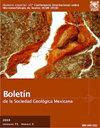伊朗中部Nakhlak地区Olenekian晚期-中Anisian-Alam组的岩石地层学、岩相和沉积条件
IF 0.4
4区 地球科学
Q4 GEOLOGY
引用次数: 0
摘要
本研究旨在研究伊朗中部沉积构造带Nakhlak群上Olenekian-中Anisian矿床的岩石学特征和沉积环境。为此,首先选择了一段厚度为720米的沉积物,并从该段中提取了190个样品用于制备薄片。此外,还进行了定量和定性实验室测试,并选择了25个砂岩样本进行点计数器分析。结果表明,该组的主要矿床与硅化碎屑岩、碳酸盐岩和火山碎屑岩类型有关,它们呈两个相组合的形式。研究剖面底部厚度为90米的相组合A具有碎屑、碳酸盐和火山碎屑相的周期性。该组合的碎屑相由细粒砂岩组成。此外,A组合碳酸盐相具有粒内鲕粒灰岩和鲕粒粒灰岩两种微相特征。此外,凝灰岩是唯一与A组合相关的火山碎屑相,具有层状结构、交错层理、人字形层理以及向上变薄和增厚旋回。沉积较晚的相组合B更多地位于剖面的中部和顶部。相组合B厚660米,具有碎屑和石灰岩相的周期性。该组合碎屑相包括砾岩、卵石粗粒砂岩、中粒砂岩至薄层粉砂岩和页岩四种岩相。碳酸盐相由砂质碎屑内砂岩和泥岩四种微相组成。此外,在B相中观察到滑塌结构、交错层理、湍流、boudinage结构和沉积物的回旋,以及侵蚀通道的影响。对该序列进行的现场和实验室研究表明,A相组合的结构沉积在混合硅碎屑-碳酸盐斜坡中。最后,通过增加深海和浊流系统中相组合B的深度,留下了海底峡谷和海底扇环境。本文章由计算机程序翻译,如有差异,请以英文原文为准。
Lithostratigraphy, lithofacies and deposition conditions of the late Olenekian-middle Anisian Alam Formation in the Nakhlak area, central Iran
The present study aims to investigate petrography characteristics and sedimental environments of upper Olenekian–middle Anisian deposits of Nakhlak group in the sedimentary-structural zone of central Iran. To this end, a section of these deposits with a thickness of 720 meters was first selected, and 190 samples were taken from this section for preparing thin sections. Also, quantitative and qualitative laboratory tests were performed and 25 samples of sandstone were selected for point counter analysis. The results indicated that the major deposits of this formation are related to siliciclastic, carbonate, and pyroclastic types, which are in the form of two facies associations. The facies association A at the bottom of the studied section with the thickness of 90 meters has a periodicity of clastic, carbonate, and pyroclastic facies. The clastic facies of this association consists of fine-grained sandstone. In addition, the carbonate facies in association A are characterized by two microfacies consisting of intraclast oolitic grainstone and oolitic grainstone. Further, tuffite is the only pyroclastic facies related to association A, which has a laminate structure, cross-bedding lamination, herringbone bedding, and upward-thinning and thickening cycles. The facies association, B which is deposited later, is more in the middle and top part of the section. The facies association B is 660 meters thick and has a periodicity of clastic and limestone facies. Clastic facies of this association includes four lithofacies such as conglomerate, pebble coarse-grained sandstone, medium-grained sandstone to thin layer siltstone and shale. The carbonate facies consists of four microfacies such as sandy intraclastic wackestone and mudstone. Furthermore, slumping structures, cross bedding, turbulence, boudinage structure, and convolute of sediments, along with the effects of erosional channels are observed in facies B. Field and laboratory studies conducted on this succession indicate the structure of facies association A was deposited in a mixed siliciclastic carbonate ramp. Finally, submarine canyons and submarine fan environments were left by increasing the depth of the facies association B in the deep part of sea and turbidity systems.
求助全文
通过发布文献求助,成功后即可免费获取论文全文。
去求助
来源期刊
CiteScore
1.40
自引率
12.50%
发文量
34
审稿时长
50 weeks
期刊介绍:
The Boletín de la Sociedad Geológica Mexicana is a completely free-access electronic journal published semi-annually that publishes papers and technical notes with its main objective to contribute to an understanding of the geology of Mexico, of its neighbor areas, and of geologically similar areas anywhere on Earth’s crust. Geology has no boundaries so we may publish papers on any area of knowledge that is interesting to our readers.
We also favor the publication of papers on relatively unfamiliar subjects and objectives in mainstream journals, e.g., papers devoted to new methodologies or their improvement, and areas of knowledge that in the past had relatively little attention paid them in Mexican journals, such as urban geology, water management, environmental geology, and ore deposits, among others. Mexico is a land of volcanos, earthquakes, vast resources in minerals and petroleum, and a shortage of water. Consequently, these topics should certainly be of major interest to our readers, our Society, and society in general. Furthermore, the Boletín has been published since 1904; that makes it one of the oldest scientific journals currently active in Mexico and, most notably, its entire contents, from the first issue on, are available online.

 求助内容:
求助内容: 应助结果提醒方式:
应助结果提醒方式:


